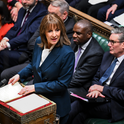A riot is a riot, and in a democracy with a government which is not attacking its own law-abiding citizens, the correct first response is to call riots by their proper name. The second is to support unequivocally the police and the courts in putting them down.
This needs to be said not only because of the disgraceful equivocation over the past week of Nigel Farage and his fellow dog whistlers to the far right. But because even the BBC has been calling these riots “anti-immigration protests”—as if there is any equivalence between peaceful demonstrations and this week’s violence and arson, including violent attacks on hotels housing asylum seekers.
The second correct step in dealing with riots is to deal with their causes. By which I don’t mean—as some Tory leadership contenders appear to think—giving Farage control of immigration policy. I mean dealing with the weaknesses in the law and state regulation which promoted the violent gangs who did the rioting.
As with the 2011 riots, but even more so today, this centres on non-traditional and social media. X and other social media platforms have been giving free rein, even encouragement, to far-right organisers like Tommy Robinson, thereby fanning the flames and supporting the organisation of the riots, including the misinformation and conspiracy theories about the Southport murders which initially lit the fuse. Free speech does not mean freedom to provoke violence and riots; nor does it mean granting a platform to far-right thugs and their henchmen.
The biggest offender in this dangerous abuse of social media is no less than the proprietor of social media platform X, Elon Musk. It is not just that Musk allowed Robinson and other far-right conspirators back on X in the name of free speech. Worse, he has been personally interacting with them and promoting them, and using his own mega platform to make disgraceful, incendiary statements. These include the claim that civil war is “inevitable” in Britain after these riots, which may rank as the most incendiary statement about British politics made personally by a media proprietor since Lord Rothermere wrote articles in his Daily Mail supporting Hitler, Mosley and the fascists in the 1930s.
It is obvious that there needs to be more regulation of social media to protect against incitement to violence, dangerous extremism and terrorism. Both named and anonymous accounts which engage in any of these activities should be suspended or banned, whoever they belong to. And there needs to be some—preferably judicial and arm’s length from government—means of doing so. This is a big issue for the aftermath of this week’s riots.
What of migration and public policy? Whatever your views on our levels of immigration and asylum seeking, the point to note here is that the processes of democracy, in response to public opinion, were focused on reducing immigration long before the riots. Farage has been campaigning on little else since the Brexit referendum and Rishi Sunak and his government talked about little else for months before the election. Labour’s disagreement has been about means not ends.
The real failure here—as in so much that has gone wrong in Britain over the last decade—resides with Boris Johnson, who claimed that reducing immigration was a justification for Brexit and then proceeded to increase it massively when he became prime minister in 2019. But no surprise there.
Who is to blame for the riots?
Social media has whipped up this week’s violence and arson. But the real failure lies with the last government
August 07, 2024

Image: ZUMA Press Inc / Alamy













